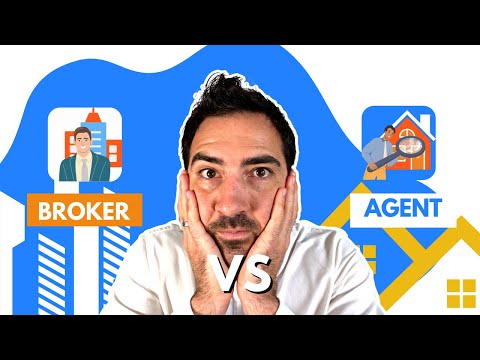Strap in folks, because we have quite a education to embark today. Among the several twist and turns you can expect to make on your journey through the real estate industry, the confusion between ‘real estate broker vs agent’ is going to be a common intersection. So let’s get straight to breaking down this often tangled terminology and get this show on the road.
Deciphering Real Estate Roles: Broker vs Realtor
Alright, first off, let’s get something straight – the real estate industry isn’t just a two player game. There’s a whole bunch of roles involved, including appraisers, inspectors, and even geologists in some cases. But for today, we’re focusing on two of the biggest players: the real estate broker and the agent.
The term ‘broker vs realtor’ often crops up and causes confusion like Pink Floyd at a rave, but to be clear, a Realtor is just a real estate professional who’s a member of the National Association of Realtors. They can be either a broker or an agent. But between a real estate broker and an agent, there’s quite a few differences to consider.

Delineation of Duties: What Does a Realtor Do?
First, let’s look at what a Realtor does. Essentially, a Realtor assists individuals in buying, selling, and renting properties. They act as a go-between for buyers and sellers and should have detailed knowledge about the local market.
This includes understanding deal-making skills, like “How much do Realtors charge To find a rental” or an excellent persuasive capability for convincing clients in “How To buy a rental property With no money“. Some of the usual duties include marketing properties, arranging viewings, negotiating sales, and helping with paperwork.
A successful Realtor isn’t just someone who knows the ropes, they also need to have excellent people skills, and a good understanding of ethical issues, especially when they deal with special agency real estate scenarios.

| Real Estate Agent | Real Estate Broker | |
|---|---|---|
| Definition | A real estate agent is licensed to help people buy and sell real estate. They can represent either the buyer or the seller. They are paid a commission when a deal is completed. | A real estate broker does the same job as an agent, but is licensed to work independently and may employ agents. They have the added responsibility of ensuring all real estate transactions are lawful, all paperwork is accurately completed, and all finances accounted for. |
| License Requirements | Real estate agents must pass a state exam to receive their license. They must also work under a real estate broker. | Real estate brokers must have at least one to three years of experience as a licensed real estate agent. They also need to pass a state broker’s exam, which is more complex than the agent’s exam. |
| Representations | Real estate agents represent insurance companies. | Real estate brokers represent their clients, having a fiduciary duty to them. This means they play an advisory role in the process. |
| Responsibilities | Agents are responsible for showing properties to potential buyers, marketing properties for sellers, and negotiating contracts. | Brokers can perform the tasks of real estate agents, but they are also responsible for checking legality of real estate transactions, ensuring accuracy of paperwork, and accounting for finances. They might also run their own real estate businesses, employing agents under them. |
| Income | Agents receive their income from commissions on their closed real estate transactions. | Brokers can earn commissions like an agent, but they can also receive a part of the commissions of the agents they employ. Plus, they can earn profits from their own real estate businesses. |
Inside the Brokerage: What is a Broker in Real Estate?
So, you might be asking, “what is a broker in real estate?” Or even, “how is a broker any different from an agent?” Let’s break this down.
A broker is typically someone who has taken their real estate career to the next level. They’re a step or two above agents, having sat for more exams and gained additional licensures. They can work independently, and unlike agents, can also hire other agents to work for them.
A broker can also perform appraisals, which is why knowing about things like “Brokers price opinion” becomes crucial to them. The point we’re trying to hammer home here is that brokers have many duties, donning multiple hats during real estate transactions.

The Real Estate Agent: An Integral Cog in the Real Estate Machine
Now let’s get a better look at the other side of the ‘real estate broker vs agent’ equation. A real estate agent, like the broker, also works in transactions involving properties. They’re sort of the foot soldiers of the industry, the ones out in the field showcasing properties, hashing out deals, and generally making sure things are running smoothly – think of them as the gears that keep the machine moving.
They’re often the ones navigating through the complex statuses of property transactions, figuring out “What Does pending mean on realtor” or “What Does under contract mean“. Essentially, they’re the hands-on crowd. But they can’t do it all – for instance, completing deals and transactions usually requires the oversight of (you guessed it) a broker.

A Critical Analysis: Real Estate Agent vs Broker
When we talk about the contest of ‘real estate agent vs broker’, the differences might seem clear cut to some, but there’s more beneath the surface.
In essence, they share a lot of similar duties, but a broker has a larger scope and carries more responsibilities. For an agent, getting into a ‘broker’ role isn’t as easy as it sounds, involving extensive additional examinations and gaining experience.
On the other hand, for an individual stepping into the real estate industry, the role of an agent might serve as the perfect entry point, and resources like “How To get Into real estate” might prove handy.

Agent to Advocate: The Value of the Listing Agent
Now, nestled within the realm of the agent, you’ll find the listing agent. These are the guys who represent the seller in a transaction. From the buyer’s perspective, understanding the value that the listing agent brings can help significantly while dealing with terms like “What Does contingent mean in real estate“.
Having such an agent involved could change the whole equation, and it’s always important to find the ‘best market‘ conditions – and a formidable listing agent certainly plays a part in that.

A Closer Look at ‘The Broker’: More Than Just a Title
The role of a broker isn’t just a title, it’s a big responsibility. It’s the highest level of licensing you can have in real estate, and it comes with its fair share of legal and ethical duties.
On a positive note, the title does offer more freedom, including the ability to start your own brokerage and have other realtors or agents working for you. However, the broker’s duties also include complying with stringent legal obligations like preparing a ‘quit claim deed Michigan‘, or handling complicated transactions.
Enhancing Real Estate Comprehension: Making Sense of ‘Real Estate Broker vs Agent’
With real estate jargon flying about, making head or tail of ‘real estate broker vs agent’ can seem daunting. But in simple terms, agents are the hands-on, in-the-field people who handle most of the front-end work. Brokers, on the other hand, perform a more supervisory role, overseeing the legal aspect of transactions, and may even run their own brokerage.
In a real estate transaction, you’ll usually find agents and brokers working in tandem. They both bring essential skills to the table and help ensure that all parts of the machinery are moving smoothly.
Empowering Prospective Real Estate Professionals: Key Insights and Future Prospects
So how does the future look like for brokers and agents? Given today’s booming real estate industry, both roles have promising futures.
For those keen on entering the industry and becoming a real estate professional, understanding the differences between a broker and an agent can help you choose your path wisely. For instance, deciding on a broker’s role could mean dealing with more business administrative tasks, alongside complex legal operational duties like “grant deed” or “quit claim deed California“.
On the bright side, the potential pay off as a successful broker could be significantly more appealing than that of an agent. However, kicking off your career as a real estate agent does involve lesser upfront requirements and offers an excellent entry point into the world of real estate.
Bridging the Gap: A Final Word on’ Real Estate Broker vs Agent’
Here’s the big takeaway folks – there isn’t necessarily a ‘better’ or ‘worse’ choice when it comes to being a broker or an agent. Both roles are vital gears in the well-oiled machine that makes up the industry.
Remember, the best choice for you depends on your long-term goals, your willingness to take on responsibilities, and ultimately, how you want to shape your career in real estate. So, whether you’re aiming to be a broker with a bunch of realtors listed under you, or an agent handling the ground work, the knowledge is now in your hands. Go make that informed choice!



